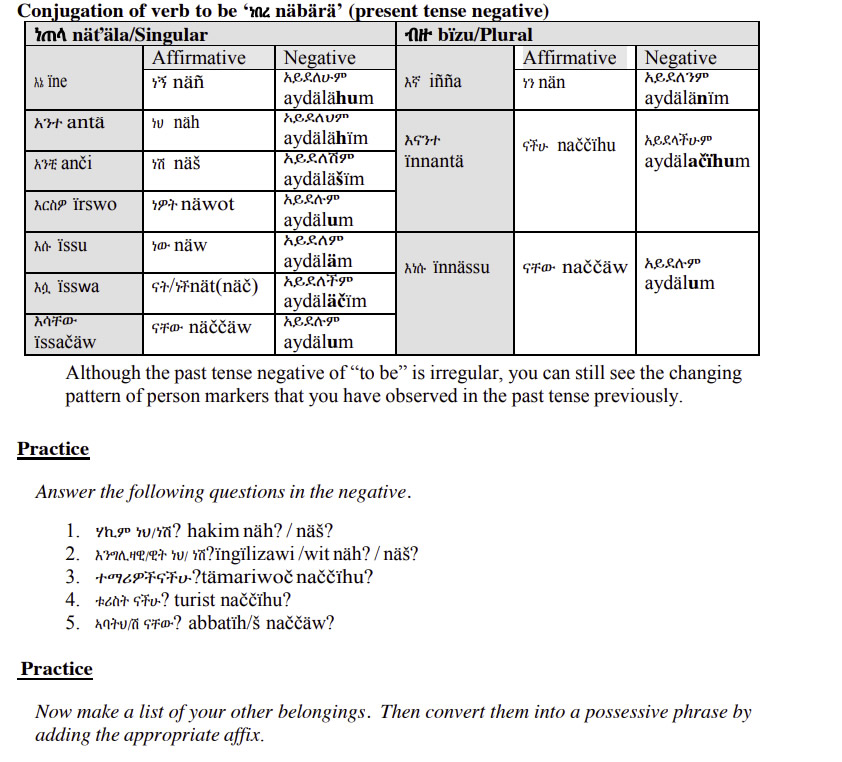Difference between revisions of "Language/Amharic/Grammar/The-Possessive-Adjectives"
m (Quick edit) |
|||
| (One intermediate revision by the same user not shown) | |||
| Line 1: | Line 1: | ||
[[File:Amharic-Language-PolyglotClub.png|thumb]] | [[File:Amharic-Language-PolyglotClub.png|thumb]] | ||
<div | <div class="pg_page_title"> The Possessive Adjectives in Amharic </div> | ||
The Possessive Adjectives (first method) Now that you have learned the suffix to indicate “my”, study the following chart of suffixes to indicate possession by each personal pronoun. Sometimes you will need to tell people, for example, that you are NOT a doctor, that you are NOT from England, etc. You have previously seen the negative form of the verb ማግባት magїbat [ማግባት agäbba]. Now study the negative form of “to be”, which is slightly irregular. | The Possessive Adjectives (first method) Now that you have learned the suffix to indicate “my”, study the following chart of suffixes to indicate possession by each personal pronoun. Sometimes you will need to tell people, for example, that you are NOT a doctor, that you are NOT from England, etc. You have previously seen the negative form of the verb ማግባት magїbat [ማግባት agäbba]. Now study the negative form of “to be”, which is slightly irregular. | ||
[[File:Amharic-Language-Conjugation-to-be-PolyglotClub.jpg]] | [[File:Amharic-Language-Conjugation-to-be-PolyglotClub.jpg]] | ||
<span link>Don't hesitate to look into these other pages after completing this lesson:</span> [[Language/Amharic/Grammar/%E2%80%9Cto-be%E2%80%9D-and-%E2%80%9Cto-have%E2%80%9D|“to be” and “to have”]], [[Language/Amharic/Grammar/Direct-and-Indirect-Object-Affixes|Direct and Indirect Object Affixes]], [[Language/Amharic/Grammar/Asking-If-and-Saying-Whether-It-Is-“Suitable”-or-Not|Asking If and Saying Whether It Is “Suitable” or Not]] & [[Language/Amharic/Grammar/Negative-Imperatives|Negative Imperatives]]. | |||
==Source== | ==Source== | ||
https://www.livelingua.com/peace-corps/Amharic/Amharic%20Peace%20Corps%20Language%20Manual-2015.pdf | https://www.livelingua.com/peace-corps/Amharic/Amharic%20Peace%20Corps%20Language%20Manual-2015.pdf | ||
==Other Lessons== | |||
* [[Language/Amharic/Grammar/Simple-Gerundive|Simple Gerundive]] | |||
* [[Language/Amharic/Grammar/The-Present-Perfect-Tense|The Present Perfect Tense]] | |||
* [[Language/Amharic/Grammar/The-Past-Perfect-Tense|The Past Perfect Tense]] | |||
* [[Language/Amharic/Grammar/Direct-and-Indirect-Object-Affixes|Direct and Indirect Object Affixes]] | |||
* [[Language/Amharic/Grammar/The-Simple-Past|The Simple Past]] | |||
* [[Language/Amharic/Grammar/Simple-Sentence|Simple Sentence]] | |||
* [[Language/Amharic/Grammar/Personal-pronouns|Personal pronouns]] | |||
* [[Language/Amharic/Grammar/bästä-prefix|bästä prefix]] | |||
* [[Language/Amharic/Grammar/Asking-If-and-Saying-Whether-It-Is-“Suitable”-or-Not|Asking If and Saying Whether It Is “Suitable” or Not]] | |||
* [[Language/Amharic/Grammar/Simple-Past-Tense-Forms-of-Other-Verbs-(Negative)|Simple Past Tense Forms of Other Verbs (Negative)]] | |||
<span links></span> | |||
Latest revision as of 13:09, 27 March 2023
The Possessive Adjectives (first method) Now that you have learned the suffix to indicate “my”, study the following chart of suffixes to indicate possession by each personal pronoun. Sometimes you will need to tell people, for example, that you are NOT a doctor, that you are NOT from England, etc. You have previously seen the negative form of the verb ማግባት magїbat [ማግባት agäbba]. Now study the negative form of “to be”, which is slightly irregular.
Don't hesitate to look into these other pages after completing this lesson: “to be” and “to have”, Direct and Indirect Object Affixes, Asking If and Saying Whether It Is “Suitable” or Not & Negative Imperatives.
Source[edit | edit source]
https://www.livelingua.com/peace-corps/Amharic/Amharic%20Peace%20Corps%20Language%20Manual-2015.pdf
Other Lessons[edit | edit source]
- Simple Gerundive
- The Present Perfect Tense
- The Past Perfect Tense
- Direct and Indirect Object Affixes
- The Simple Past
- Simple Sentence
- Personal pronouns
- bästä prefix
- Asking If and Saying Whether It Is “Suitable” or Not
- Simple Past Tense Forms of Other Verbs (Negative)

